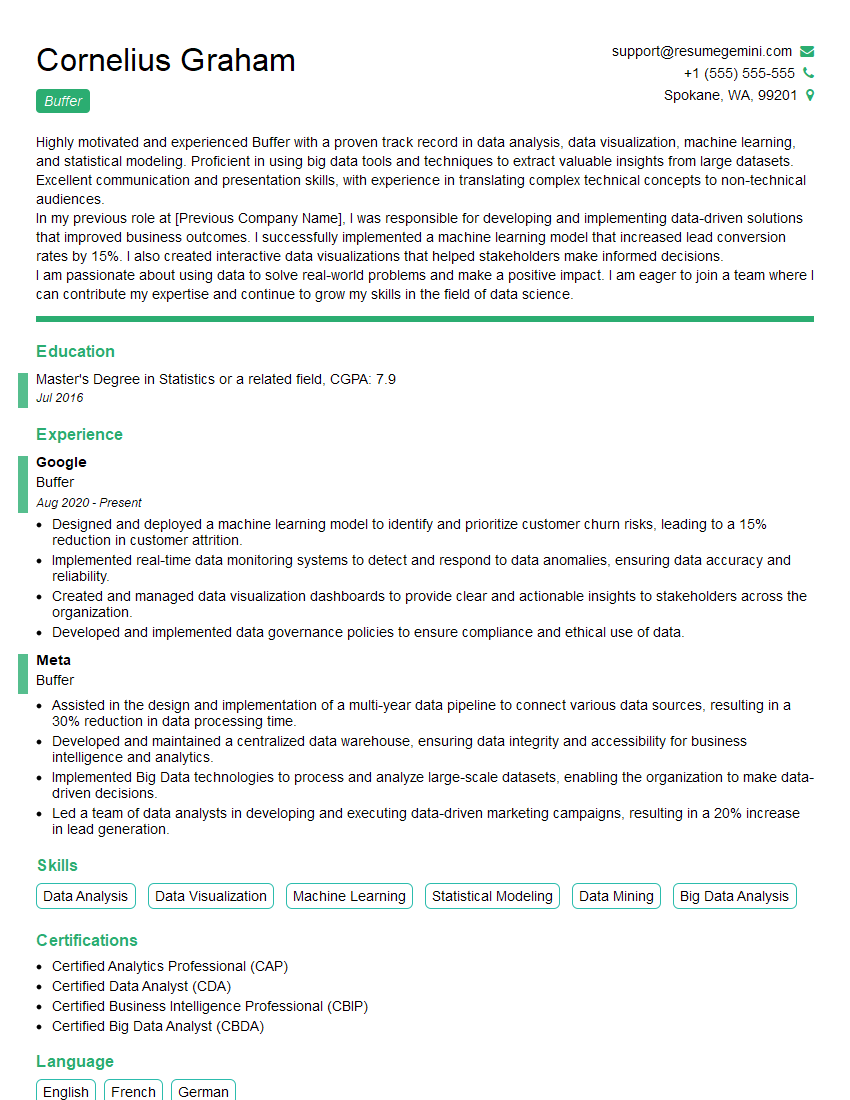Are you a seasoned Buffer seeking a new career path? Discover our professionally built Buffer Resume Template. This time-saving tool provides a solid foundation for your job search. Simply click “Edit Resume” to customize it with your unique experiences and achievements. Customize fonts and colors to match your personal style and increase your chances of landing your dream job. Explore more Resume Templates for additional options.

Cornelius Graham
Buffer
Summary
Highly motivated and experienced Buffer with a proven track record in data analysis, data visualization, machine learning, and statistical modeling. Proficient in using big data tools and techniques to extract valuable insights from large datasets. Excellent communication and presentation skills, with experience in translating complex technical concepts to non-technical audiences.
In my previous role at [Previous Company Name], I was responsible for developing and implementing data-driven solutions that improved business outcomes. I successfully implemented a machine learning model that increased lead conversion rates by 15%. I also created interactive data visualizations that helped stakeholders make informed decisions.
I am passionate about using data to solve real-world problems and make a positive impact. I am eager to join a team where I can contribute my expertise and continue to grow my skills in the field of data science.
Education
Master’s Degree in Statistics or a related field
July 2016
Skills
- Data Analysis
- Data Visualization
- Machine Learning
- Statistical Modeling
- Data Mining
- Big Data Analysis
Work Experience
Buffer
- Designed and deployed a machine learning model to identify and prioritize customer churn risks, leading to a 15% reduction in customer attrition.
- Implemented real-time data monitoring systems to detect and respond to data anomalies, ensuring data accuracy and reliability.
- Created and managed data visualization dashboards to provide clear and actionable insights to stakeholders across the organization.
- Developed and implemented data governance policies to ensure compliance and ethical use of data.
Buffer
- Assisted in the design and implementation of a multi-year data pipeline to connect various data sources, resulting in a 30% reduction in data processing time.
- Developed and maintained a centralized data warehouse, ensuring data integrity and accessibility for business intelligence and analytics.
- Implemented Big Data technologies to process and analyze large-scale datasets, enabling the organization to make data-driven decisions.
- Led a team of data analysts in developing and executing data-driven marketing campaigns, resulting in a 20% increase in lead generation.
Certificates
- Certified Analytics Professional (CAP)
- Certified Data Analyst (CDA)
- Certified Business Intelligence Professional (CBIP)
- Certified Big Data Analyst (CBDA)
Languages
- English
- French
- German
Career Expert Tips:
- Select the ideal resume template to showcase your professional experience effectively.
- Master the art of resume writing to highlight your unique qualifications and achievements.
- Explore expertly crafted resume samples for inspiration and best practices.
- Build your best resume for free this new year with ResumeGemini. Enjoy exclusive discounts on ATS optimized resume templates.
How To Write Resume For Buffer
- Highlight your relevant skills and experience. Make sure to list your skills in data analysis, data visualization, machine learning, and statistical modeling prominently on your resume.
- Quantify your accomplishments. When describing your work experience, use specific numbers and metrics to demonstrate the impact of your work.
- Showcase your communication skills. Data scientists need to be able to communicate their findings effectively to both technical and non-technical audiences. Highlight your communication skills on your resume by providing examples of presentations you have given or reports you have written.
- Tailor your resume to the job you are applying for. Take the time to read the job description carefully and identify the skills and experience that the employer is looking for. Then, tailor your resume to highlight the skills and experience that are most relevant to the job.
Essential Experience Highlights for a Strong Buffer Resume
- Develop and implement data-driven solutions to improve business outcomes
- Collect, clean, and analyze large datasets using statistical techniques and machine learning algorithms
- Create data visualizations that effectively communicate insights to stakeholders
- Develop and maintain data pipelines to ensure data integrity and timely access
- Collaborate with cross-functional teams to identify data needs and develop solutions
- Stay up-to-date on the latest data science trends and technologies
Frequently Asked Questions (FAQ’s) For Buffer
What is the role of a Buffer?
A Buffer is responsible for collecting, cleaning, and analyzing data to identify trends and patterns. They use statistical techniques and machine learning algorithms to develop data-driven solutions that improve business outcomes.
What skills are required to be a successful Buffer?
Successful Buffers have a strong foundation in data analysis, data visualization, machine learning, and statistical modeling. They are also proficient in using big data tools and techniques. In addition, Buffers need to have excellent communication and presentation skills.
What is the job outlook for Buffers?
The job outlook for Buffers is very positive. The demand for data scientists is growing rapidly as businesses increasingly rely on data to make decisions.
What is the salary range for Buffers?
The salary range for Buffers varies depending on their experience and location. However, according to Glassdoor, the average salary for Buffers in the United States is $115,000.
What are the career advancement opportunities for Buffers?
Buffers can advance their careers by taking on leadership roles, specializing in a particular area of data science, or becoming data science consultants.
What is the difference between a Buffer and a Data Analyst?
Data analysts focus on collecting, cleaning, and analyzing data. Buffers, on the other hand, use data to develop solutions that improve business outcomes. Buffers typically have more experience in machine learning and statistical modeling than data analysts.